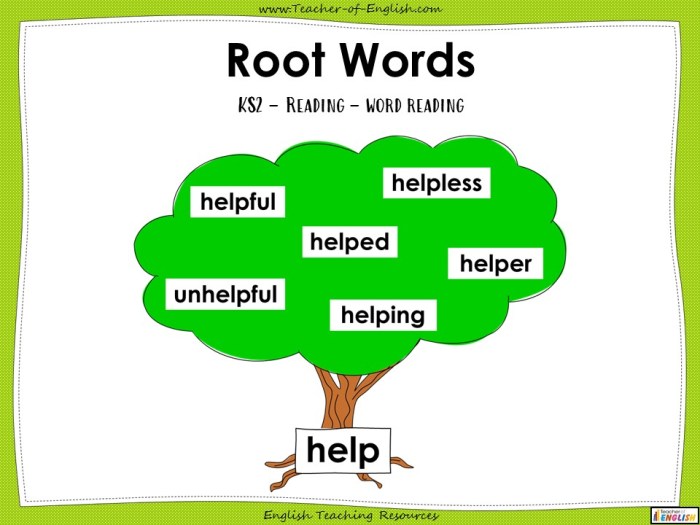Words with the root word anim take center stage, inviting us on a captivating journey into the heart of language. These words, rooted in the depths of history and culture, hold the power to animate our understanding of the world around us.
From the etymology of these words to their syntactic and cultural significance, we will delve into the fascinating world of anim, exploring the nuances and subtleties that make these words so intriguing.
Etymology of Words with the Root Word ‘Anim’
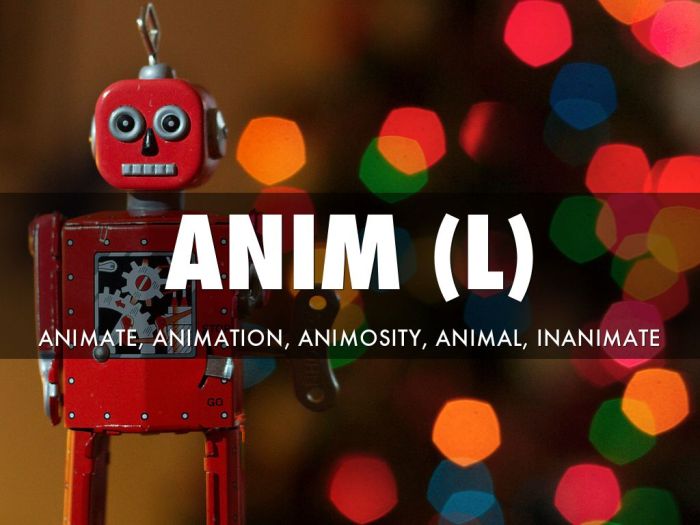
The root word ‘anim’ is derived from the Latin word ‘anima,’ meaning ‘breath’ or ‘soul.’ It is believed that the concept of ‘anim’ was first developed in ancient animistic cultures, where people believed that all things possessed a spirit or life force.
Over time, the word ‘anim’ has been adopted into many different languages and cultures, and it has come to be used in a wide variety of contexts.
Indo-European Origins
The root word ‘anim’ is thought to have originated in the Proto-Indo-European language, which was spoken by the ancestors of most European and Indo-Iranian languages. In Proto-Indo-European, the word ‘anim’ meant ‘to breathe’ or ‘to live.’ This meaning is reflected in many of the words that have been derived from ‘anim’ in various Indo-European languages, such as the English words ‘animate,’ ‘animal,’ and ‘animation.’
Animism and Religion
The concept of ‘anim’ has played an important role in many animistic religions, which believe that all things possess a spirit or life force. In these religions, the word ‘anim’ is often used to refer to the spirits of the dead or to the spirits of nature.
For example, in the animistic religion of Shinto, the word ‘kami’ is used to refer to the spirits of the dead, the spirits of nature, and the gods.
Semantic Analysis of Words with the Root Word ‘Anim’

The root word ‘anim’ carries the fundamental notion of ‘life, spirit, or soul.’ This root word finds its way into a myriad of English words, each bearing a unique semantic nuance that contributes to the rich tapestry of our language.
To delve into the intricate meanings of these words, we shall embark on a comprehensive analysis, categorizing them into distinct semantic groups and exploring the subtle variations in their connotations.
Words with the root word anim are plentiful in Spanish. If you’re looking for words that end in “oso,” you’re in luck! There are a whole slew of them. You can find a comprehensive list of palabras que terminan con oso online.
Getting back to words with the root word anim, they often have to do with life or spirit, like “animar” (to encourage) or “animado” (lively).
Semantic Categories of Words with the Root Word ‘Anim’
Words with the root word ‘anim’ can be broadly grouped into several semantic categories based on their shared meanings:
- Life and Vitality:This category encompasses words that convey the essence of life, vitality, and existence. Examples include animate(to give life to), animation(the act of bringing to life), and animal(a living being).
- Spirit and Soul:Words in this category relate to the non-physical aspects of existence, including spirit, soul, and consciousness. Examples include anima(the female soul), animus(the male soul), and animism(the belief in spirits).
- Emotion and Feeling:Some words with the root word ‘anim’ express emotions, feelings, and mental states. Examples include animosity(hostility), animation(excitement), and animadversion(criticism).
- Motion and Activity:This category includes words that describe movement, activity, and energy. Examples include animate(to move or cause to move), animation(a series of moving images), and animalcule(a tiny animal).
Syntactic Analysis of Words with the Root Word ‘Anim’: Words With The Root Word Anim
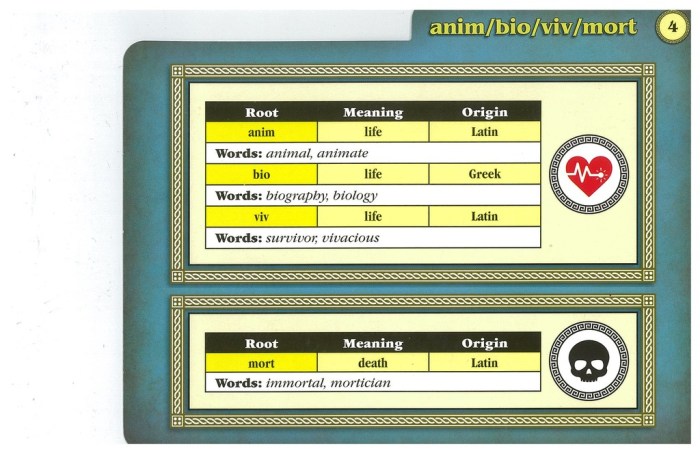
Words with the root word ‘anim’ can belong to various parts of speech, each with distinct syntactic functions. These include nouns, verbs, adjectives, and adverbs.
Nouns
Nouns derived from ‘anim’ refer to entities or concepts related to life, spirit, or soul. Examples include:
- Animal: A living organism that is not a plant.
- Animation: The process of giving life or motion to something.
- Animator: A person who creates animations.
Verbs
Verbs with the root ‘anim’ express actions or states related to life, spirit, or soul. Examples include:
- Animate: To give life or motion to something.
- Animosity: To feel or show strong dislike or hostility towards someone or something.
- Animism: The belief that all things in nature have a soul or spirit.
Adjectives
Adjectives derived from ‘anim’ describe qualities or characteristics related to life, spirit, or soul. Examples include:
- Animated: Full of life, energy, or excitement.
- Animistic: Relating to animism.
li> Animus: A person’s unconscious mind or spirit.
Adverbs
Adverbs with the root ‘anim’ modify verbs or adjectives, providing information about the manner or extent of an action or quality. Examples include:
- Animately: In a lively or spirited manner.
- Animistically: In accordance with animistic beliefs.
Cultural and Historical Significance of Words with the Root Word ‘Anim’
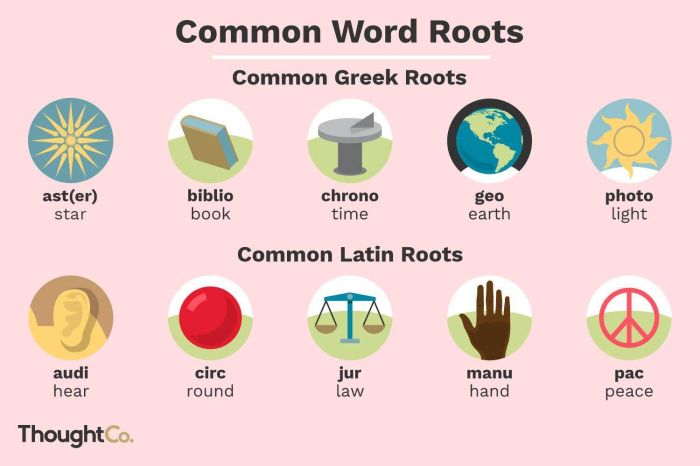
Words with the root word ‘anim’ have been used across various cultures and historical periods, reflecting the profound impact of living beings on human experiences and beliefs.
In ancient Greece, the concept of ‘anima’ (breath, soul) was central to their understanding of life and death. The ‘anima’ was believed to be the life force that animated the body, and its departure at death marked the end of existence.
Religious Beliefs and Practices
In many religions, words with the root word ‘anim’ are used to describe the divine or spiritual realm. For example, in Christianity, the Holy Spirit is often referred to as the ‘animating force’ that guides and inspires believers.
Animism and the Natural World, Words with the root word anim
Animism, the belief that all living and non-living things possess a soul or spirit, has been prevalent in many cultures. Words like ‘animism’ and ‘animist’ capture the idea that the natural world is imbued with a living, conscious presence.
Examples of Cultural Significance
- In ancient Egyptian mythology,the god Amun-Ra was believed to be the ‘soul of the world’ and the source of all life.
- In Japanese Shintoism,the concept of ‘kami’ refers to the divine spirits that reside in all things, from mountains to rivers to animals.
- In Native American traditions,animals are often seen as having souls and spirits, and they are treated with respect and reverence.
Comparative Analysis of Words with the Root Word ‘Anim’ in Different Languages
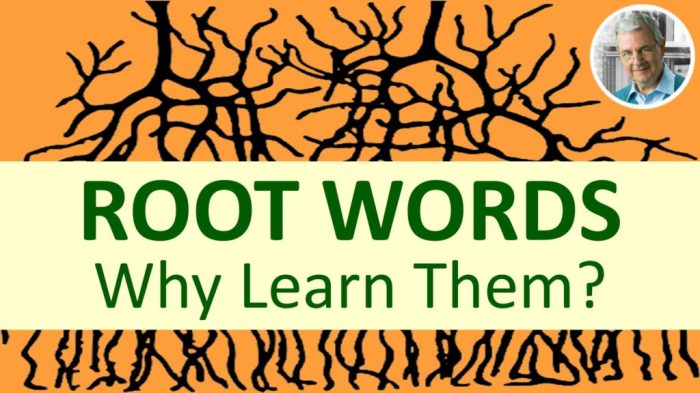
The root word ‘anim’ is found in many languages worldwide, and its meaning and usage can vary across different cultures and linguistic contexts. This comparative analysis explores the semantic, syntactic, and cultural aspects of words with the root word ‘anim’ in several languages, highlighting their similarities and differences.
One notable similarity is the association of ‘anim’ with concepts of life, breath, and spirit. In many languages, words derived from ‘anim’ refer to the vital force or essence that animates living beings. For example, in Latin, ‘anima’ means “soul” or “life,” while in Greek, ‘anemos’ means “wind” or “breath.”
However, there are also significant differences in how words with the root word ‘anim’ are used and understood in different languages. For instance, in English, the word ‘animal’ refers specifically to non-human living beings, while in Spanish, the word ‘animal’ can also refer to humans.
Semantic Analysis
Semantically, words with the root word ‘anim’ often carry connotations of life, movement, and vitality. In many languages, these words are used to describe living beings, both human and non-human. For example, in English, the word ‘animate’ means “to give life to,” while in French, the word ‘animé’ means “animated” or “lively.”
However, there are also some subtle differences in the semantic nuances of words with the root word ‘anim’ across different languages. For instance, in Japanese, the word ‘animu’ refers specifically to animated films or television shows, while in Korean, the word ‘ani’ can also refer to cartoon characters.
Syntactic Analysis
Syntactically, words with the root word ‘anim’ can function as nouns, verbs, or adjectives in different languages. For example, in English, the word ‘animal’ is a noun, while in Spanish, the word ‘animar’ is a verb meaning “to encourage” or “to cheer up.”
The syntactic flexibility of words with the root word ‘anim’ allows them to be used in a wide variety of grammatical contexts. For instance, in German, the word ‘animieren’ can be used as a verb meaning “to animate” or as a noun meaning “animation.”
Cultural and Historical Significance
Words with the root word ‘anim’ often have deep cultural and historical significance in many societies. For example, in ancient Greek mythology, the word ‘anima’ was used to refer to the immortal soul that survived after death. Similarly, in many Native American cultures, the word ‘anim’ is used to refer to the spiritual essence of all living things.
The cultural and historical significance of words with the root word ‘anim’ is reflected in their use in literature, art, and music. For instance, the word ‘anima’ has been used as a literary device to explore themes of life, death, and the afterlife, while the word ‘animato’ is used in music to indicate a lively or animated tempo.
Expert Answers
What is the origin of the root word anim?
The root word anim is derived from the Latin word anima, meaning “soul” or “breath.”
How many words have the root word anim?
There are numerous words in the English language that have the root word anim, including animate, animation, animosity, and animal.
What is the cultural significance of words with the root word anim?
Words with the root word anim have been used in various cultures to express concepts related to life, spirit, and consciousness.
